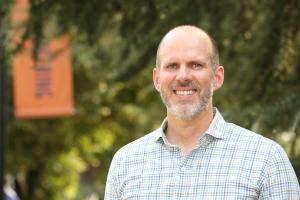
Jonathan L. Goodall, a professor of civil and environmental engineering in the University of Virginia School of Engineering and Applied Science, has been named director of UVA’s Link Lab, a multidisciplinary center for world-class research in cyber-physical systems.
Goodall — who is known for his work in water resource management, including the use of real-time sensing, control and simulation of hydrologic systems for flood mitigation — has served as associate director of the Link Lab since its creation in 2018.
Cyber-physical systems combine computing with actions occurring in the physical world using sensors and actuators. These systems are increasingly present in, and often essential to, everyday life — from setting the thermostat in your home to managing infrastructure, such as public water utilities or power grids, that serve millions of people.
“I am excited to lead the Link Lab as we continue to build on our success as one of the top cyber-physical systems labs in the country,” Goodall said. “Advancing the state-of-the-art in cyber-physical systems and training engineers and computer scientists in this interdisciplinary field will be increasingly important as computing and artificial intelligence become embedded within a wide variety of engineered systems.”
Along with graduate students in his research group and other collaborators within the Link Lab, Goodall has been advancing projects related to smart cities technology, one of the Link Lab’s research focus areas.
Goodall’s research reflects the ways in which cyber-physical systems benefit people. He and his team, for example, combine the study of stormwater management infrastructure, hydrology and computer modeling to help cities that are facing frequent flooding due to climate change.
The group also uses new and existing sources of data — such as internet-connected sensor networks, crowdsourced weather data and geographic information system data — with hydrodynamic simulation models to make more-detailed predictions of what will occur during weather events. With better information, local officials can make decisions to manage water resources in ways that take infrastructure, environmental concerns and the impact on residents into account.
Goodall received his bachelor’s degree in civil engineering from UVA in 2001 before earning his master’s and Ph.D. at the University of Texas at Austin. He joined UVA’s civil and environmental engineering faculty as an associate professor in 2013 after serving on the faculties of Duke University and the University of South Carolina.
Goodall serves on the steering committee of the UVA Environmental Resilience Institute and is a co-leader for the University’s participation in the Public Interest Technology University Network, a consortium of 43 academic institutions focused on building the field of public interest technology and preparing the next generation of civic-minded technologists.
He is a fellow of the American Society of Civil Engineers and a member of the Virginia Academy of Science, Engineering and Medicine, through which he once served as a co-chair and was a subject matter expert on a Virginia General Assembly committee to study the social and economic consequences of weather and climate-related events on the state’s coastal areas.
Beyond his public and university leadership roles, Goodall has been recognized with the Civil Engineering Teaching Award for quality teaching and commitment to students.
He has mentored dozens of undergraduates who now serve throughout the water resources community and is involved in mentoring initiatives at UVA focused on underrepresented groups in STEM fields. Additionally, he has advised 16 Ph.D. and 14 master’s students and is currently mentoring a group of eight Ph.D. students.
The Link Lab’s founders, including Goodall and his predecessor as director, BP America Professor of Computer Science John A. "Jack" Stankovic, envisioned the center as a space to encourage collaboration among researchers and practitioners from across UVA, peer universities, industries and governments to address real-world needs.
The Link Lab is fulfilling that vision, with about 40 faculty members and 200 graduate students conducting pioneering work in robotics and autonomous vehicles, smart and connected health, hardware for the internet of things, and smart cities.
The center’s affiliated members come from UVA Engineering’s programs in computer science and civil, systems, electrical, and computer engineering. Researchers collaborate with peers across Grounds, including faculty members and clinicians in the medical and architecture schools.
Since its inception, Link Lab faculty members have obtained tens of millions of dollars in sponsored research, and more than 90 graduate students — both doctoral and master’s degree recipients — have conducted their research with Link Lab faculty members.
Outgoing director Stankovic said he knows the Link Lab will be in excellent hands with Goodall at its helm.
“Jon’s research involves collaboration across disciplines and working with non-researchers in the field — decision-makers and operators who run stormwater management and public utilities that real people rely on,” Stankovic said. “He solves real problems. That’s exactly the kind of thing we created the Link Lab to do. His leadership here at UVA, across Virginia and throughout the cyber-physical research community have already elevated our national standing.”